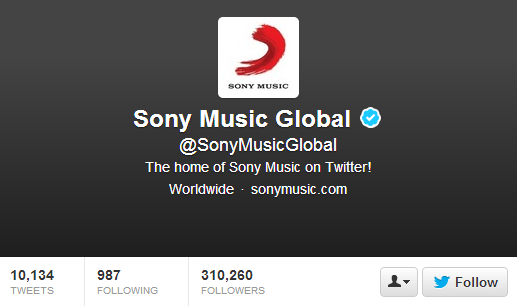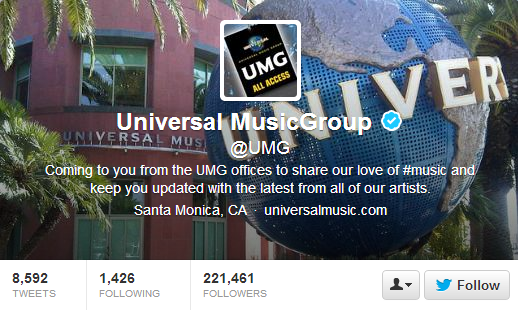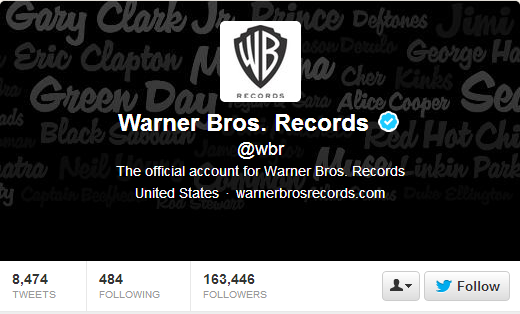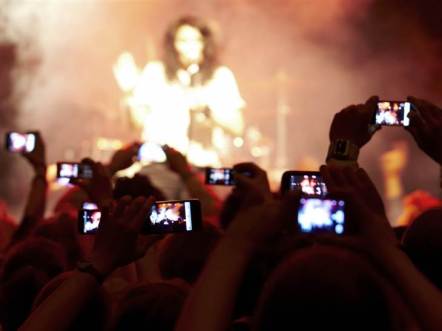Last week Warner Bros. Records were on stage for Twitter Tuesday. WBR is a daughter company with Warner Music, one of the “Big Thre” largest record labels. The three labels that hold the largest market share in the music industry are Warner Music, Universal Music Group, Sony Music. The past decade has seen the downfall or merging of multiple major record labels. Recently, EMI was sold and became a part of Universal Records. Now that only 3 major record labels remain standing, let’s see how they’re taking on the battle of social media.
Below we’ll take a brief look at each of the labels and then do a round up and comparison.
Warner Music is the only American owned group on the list. Of the three big companies they also have the fewest number of followers. Granted, they own a smaller portion of the industry than the others, but does their approach to tweeting have an affect on their fanbase? While Warner Bros. Records had personality in their tweets with the occasional retweet to promote an artist, Warner Music is nearly zero voice and all retweets. Of their last 40 tweets, 39 have been retweets. All of it is relevant information, whether it be an artist talking about an upcoming event or a music publication commending someone. Although Warner Music’s personal tweets are seldom, they retweet posts from branches of their company such as Warner Bros. Records, The Warner Sound and Warner Bros. Promo.
When they do tweet it’s usually either congratulating a member of their label for something or asking followers to “check out” something new.
Their lack of original content makes it difficult for their brand and profile to be promoted. People wanting an aggregate of other sources may still get something out of this profile, but as for news and insights, they don’t add much.
Sony Music is second in market share, but number one in Twitter reach. With over 300,000 followers, Sony boasts nearly 100,000 more followers than Universal. Their take on Twitter is very contrasting to Warner Music Group, yet similar to Warner Bros. Records. They utilize a highly informational, yet personal voice. Instead of running info like a scrolling banner on a message board, Sony’s tweets are talking at their followers. Instead of posting newspaper clippings of what others are saying about their clients, they are the ones plugging and reinforcing them. There are actually hardly any retweets. They stick to trying to engage readers with the content by stimulating the conversations with relevant information and semi-rhetorical questions.
Although they don’t respond to followers and they hardly ever retweet posts, Sony Music has a strong group of followers. This can probably be thanks to their smooth promotions, which pass viewers on to a new video or song premiere without them relying on someone else’s tweets.
Universal Music Group is the leader in major record labels. In 2012 they swallowed up (or the more technical term “merged”) EMI, reducing the “Big 4” to the “Big 3”. They may not have as many followers as Sony, but a look at their timeline doesn’t show anything that would indicate a poor job with social media. If anything, their balance of professional and personal, and original and retweeted content is a perfect blend. Everything about their profile is fun and engaging. From their collage of album covers as a background (which is similar to Warner Music’s) to their integration of Vine, Universal isn’t afraid to step out of the “suit & tie” formal atmosphere. They wish people happy birthday, redirect you to sales and host free giveaways of concerts and music. Colorful is a good word to describe this Twitter feed. Not all of their tweets are black and white advertisements for their artists. Almost all of them link to a musician on the label, but some are more acknowledgement than promotion.
Round Up
I’ve said it before, and I’ll reiterate: Twitter followers don’t directly indicate how “good” or “bad” a company is doing. With that said, it does say how people react to that company’s social media use. Twitter serves as a place for people who don’t have the time or desire to browse the web for full length blogs to scroll through and discover new info and be plugged into a network. With more and more people spending their days on Twitter, it is becoming a valuable means to relay information and brand yourself. The cool thing about it as well is that there aren’t any set rules for how to Tweet. The “Big 3” all take different approaches at gaining followers. And while Warner is getting the least involvement, it isn’t drastically behind Sony and Universal, considering the share of the market each group holds. Maybe it just comes down to who likes one group’s artists more than the others, and that will indicate a larger reception for social media use. If there is one universal thing that can be said from all seemingly “successful” Twitter users, it’s that people like getting info (normally from the actual poster) and interaction. Followers yearn for information. That’s why they follow music label Twitters, not for shocking dance moves and racy comments. They also like to know they they are noticed, which is why things like Q&A’s, contests and questions catch people’s attention.
Which of these three record labels are the “best” at using Twitter? That’s subjective. Universal brings a fun, no holds barred vibe, Warner leans on other’s posts as the primary source for content, and Sony goes a more tame, composed form of posting information.
Does one look better than the other? Let me know in the comments below!





